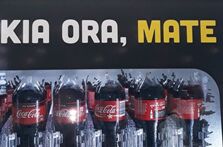向死亡问好?可口可乐发布了一条土洋结合的广告语,结果......
使用当地语言容易让当地人产生亲近感,可口可乐公司也这样想,于是该公司在新西兰的自动贩卖机上融合当地毛利语和英语写了一句话“Kia,ora,mate”,本想表达“你好,伙计”,可是,这句话在毛利人眼里却是另外一个意思。
Twitter / @waikatoreo Beverage-maker Coca-Cola made a marketing blunder in New Zealand, according to media reports.
据媒体报道,饮料生产商可口可乐公司在新西兰的市场营销闹出了一个乌龙。
The company ran a vending machine signage in the country that read "Kia ora, mate," according to online publication Stuff.
据网络媒体Stuff报道,可口可乐公司在新西兰的自动贩卖机上贴了一个“Kia ora,mate”的广告标识。

【小百科】
在毛利语中,“kia ora”就像“你好”、“hi”一样,被普遍用作一种开场白方式,直译过来则有“健康,保重”的意思。英文中的“mate”在新西兰、澳大利亚和英国等地通常是指朋友或陌生人。
可是有人指出,“mate”在毛利语中本身就带有自己的含义,寓意“死亡”,常常和“噩运、灾难、疾病”这样的负面词汇挂钩。对于使用毛利语的本地人,这句话可能会被理解成“你好,死亡(Greetings, death)”。
这样的乌龙组合迅速被网友拿来调侃。
有人说,“尽管这种高糖的软饮不好,特别是对牙齿健康不利,但据我所知它还没到立刻致死的程度啊。”
One twitter user speculated that Coca-Cola may have gained some “self-awareness,” while another just commented, “Finally, truth in advertising.”
一位推特用户推测说,可口可乐公司或许终于“自觉”起来了,还有网友评论说:“终于,广告说出了大实话。”
Others criticized the lack of research from Coca-Cola.
还有一些人批评可口可乐公司事先没有进行充分的调查。
Earlier this week, a spokesperson from the company told Maori Television that the words were "meant to bring Maori and English together," and that the label was not being disrespectful to any culture.
可口可乐公司的一名发言人本周稍早接受毛利电视台采访时说,这个标语原本是想“将毛利语和英语融合起来”,并没有不尊重任何文化的意思。
“Saying ‘hello, death’ looks like they’re fessing up how unhealthy the drink really is,” communications expert Cas Carter told the online publication Stuff.
传播专家卡斯-卡特告诉网络媒体Stuff说:“‘你好,死亡’这则标识看起来像是他们爽快地坦白了自家的饮料有多么不健康。”
She said it showed the multinational company had not bothered to take the time to do its research, or to seek local guidance.
她说,这表明这家跨国公司压根没有花时间做调查,或者咨询当地人。
"There is a growing trend among international companies to try and reflect local culture in their marketing. Done well it is awesome - done poorly - it is a major risk," she said.
她说:“越来越多的跨国公司想在市场营销中体现出当地文化,这事儿做好了效果会很棒,一旦做不好,风险也很大。”
哈卡舞 "The blunder is even greater because 'mate' is such a well-known Maori word because it is in our most well-known haka – which has been seen all over the world."
“‘mate’是非常有名的一个毛利语单词,因为它出现在最著名的毛利族战舞哈卡舞当中,在全球广为流传,所以可口可乐闹出的这个乌龙也显得更严重了。”
在最近的一波关于全球肥胖趋势的讨论中,生产碳酸饮料、高糖高热量食品的这些大公司被作为声讨的对象。今年以来,新西兰的公共媒体上也时常出现应当紧随英国的脚步开征含糖税的呼吁。
可口可乐的这次“口误”因而被调侃为一次难得的“不打自招”。
New Zealand has one of the highest rates of obesity in the developed world with one in three adult New Zealanders classified as obese.
新西兰在发达国家中肥胖率最高,三分之一的成年人被列为肥胖。
According to statistics, 50% of Māori adults are obese, as well as 18% of Māori children.
政府数据显示,毛利人中半数成年人肥胖,儿童肥胖率达18%。
在跨国公司品牌本土化的过程中,不只是可口可乐公司闹过笑话。由于对当地文化不够了解,大牌公司的广告也常常遭遇尴尬。
2017年,宜家因为一支电视广告犯了众怒。在这段30秒左右的广告中,一位中国母亲告诫女儿:“再不带男朋友回来,就别叫我妈。”广告播出之后,有不少网友称,这是对“剩女(leftover women)”的歧视,称广告传递了不恰当的价值观。